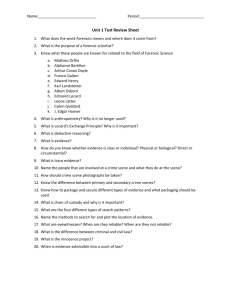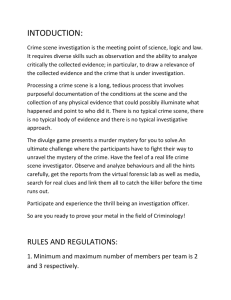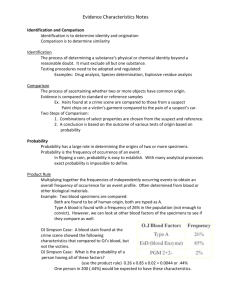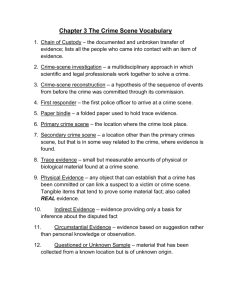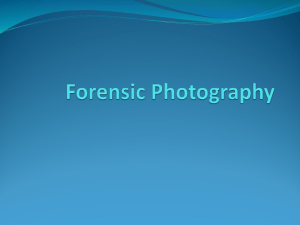How to become a crime scene investigator
advertisement
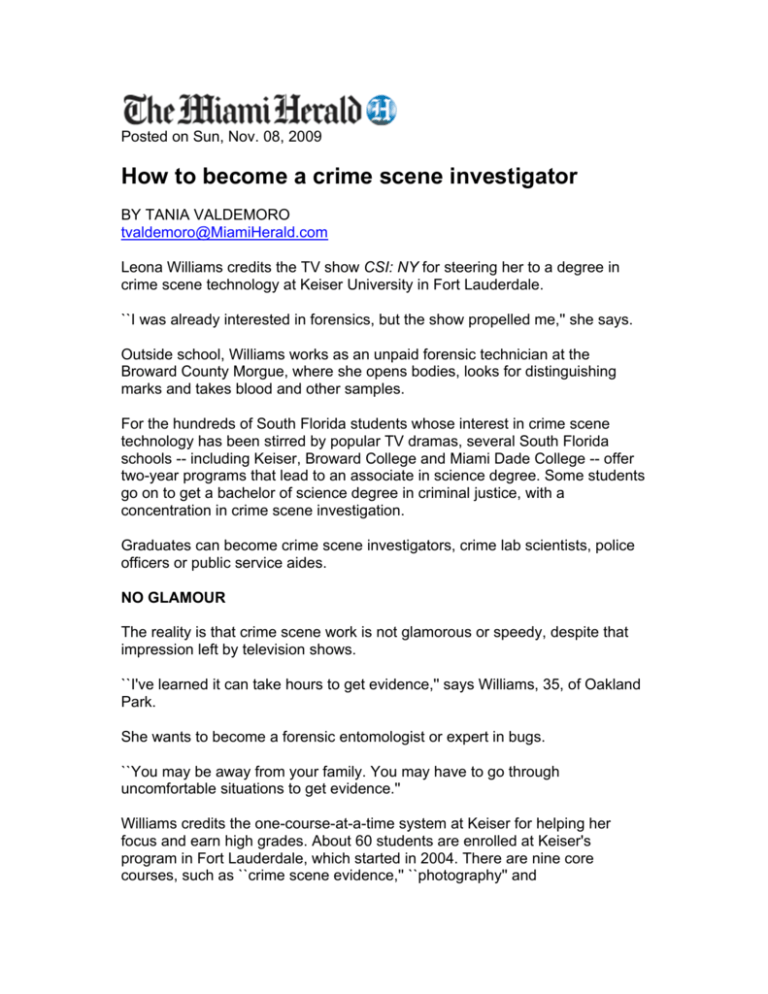
Posted on Sun, Nov. 08, 2009 How to become a crime scene investigator BY TANIA VALDEMORO tvaldemoro@MiamiHerald.com Leona Williams credits the TV show CSI: NY for steering her to a degree in crime scene technology at Keiser University in Fort Lauderdale. ``I was already interested in forensics, but the show propelled me,'' she says. Outside school, Williams works as an unpaid forensic technician at the Broward County Morgue, where she opens bodies, looks for distinguishing marks and takes blood and other samples. For the hundreds of South Florida students whose interest in crime scene technology has been stirred by popular TV dramas, several South Florida schools -- including Keiser, Broward College and Miami Dade College -- offer two-year programs that lead to an associate in science degree. Some students go on to get a bachelor of science degree in criminal justice, with a concentration in crime scene investigation. Graduates can become crime scene investigators, crime lab scientists, police officers or public service aides. NO GLAMOUR The reality is that crime scene work is not glamorous or speedy, despite that impression left by television shows. ``I've learned it can take hours to get evidence,'' says Williams, 35, of Oakland Park. She wants to become a forensic entomologist or expert in bugs. ``You may be away from your family. You may have to go through uncomfortable situations to get evidence.'' Williams credits the one-course-at-a-time system at Keiser for helping her focus and earn high grades. About 60 students are enrolled at Keiser's program in Fort Lauderdale, which started in 2004. There are nine core courses, such as ``crime scene evidence,'' ``photography'' and ``communications and writing for crime scene professionals.'' Students also have to take eight general education courses, says George Shoemaker, the university's program director for Crime Scene Technology. At Broward College's Davie campus, Lori Carpenter, 38, of Tamarac is taking night classes for her associate in science degree in crime scene technology. Her inspiration: Forensic Files on truTV. She wants to become a forensic photographer, shooting photos and videos of crime scenes. After three semesters, Carpenter credits Broward College for giving her handson experiences and a flexible schedule, which helps her balance a full-time job at a medical office. ``It's close to home, and I can take classes before work, during lunch or after work,'' she says. Like Keiser, Broward College's crime scene technology program requires students to take specialized criminal justice classes, as well as general education classes, such as English and government. John Hackett, a professor at the BC's Institute of Public Safety, says the school differs from other places because faculty are full-time, not adjunct instructors. Classes are held at the Institute, which also houses the Broward County Police Academy and exposes crime scene students to law enforcement students and professionals. The television shows have created a ``CSI effect,'' yielding positive and negative results, Hackett says. ``Probably not since the O.J. Simpson trial have CS units and programs received greater support and funding,'' he says. Real-life cases of forensic evidence exonerating people who were wrongly convicted also have emphasized the importance of this field. PROS AND CONS ``We now realize the need to rely more on physical evidence and scientific technology,'' Hackett says. The drawbacks? Budding CSI professionals have distorted expectations. ``Many students initially come to class with great expectations of the most advanced computer technologies and an instruction manual on how to solve crimes -- only to find out there is a difference between the field CS investigator and the crime lab scientists or criminalists,'' Hackett says. At Miami Dade College's North Campus, instructors say they make sure students know they are expected to multi-task and be detail-oriented. HIGH PRESSURE ``We don't accept `no' in the classroom,'' says Sharon Plotkin, a North Miami crime scene investigator who teaches classes in advance crime scenes and fingerprinting. ``It's a high-pressure situation. You have to be quick on your feet.'' Knowing the proper terminology and speaking effectively as an expert witness to jurors in court are also key, Plotkin says. She helps students polish their résumés, takes photos of them doing work for their portfolio and shares job leads. MDC also offers an associate degree in crime scene investigation, an associate degree in forensic science and a certificate program in crime scene investigation, says Ron Grimming, director of the college's School of Justice. Monica Tochez, 35, of Miami Lakes, is finishing up her coursework for a bachelor of science degree with a concentration in crime scene investigation. She started taking college classes at MDC in 2004, then learned about the CSI program. ``I'm going to be a crime scene investigator, that's for sure,'' says Tochez, who previously worked as a teleprompter operator in Romania. The school helped her get an internship at the Hialeah Police Department. Last December, her friends in the police department took her to a homicide scene where she saw a dead body. ``I was very excited. It was interesting to see rigor mortis,'' says Tochez, who has harbored a fascination with forensics since she was 12. Though she has found her calling, Tochez admits that crime scene investigation is not the dream job for everyone. ``You need to love this job. It's nothing like what we see on television,'' she says.
